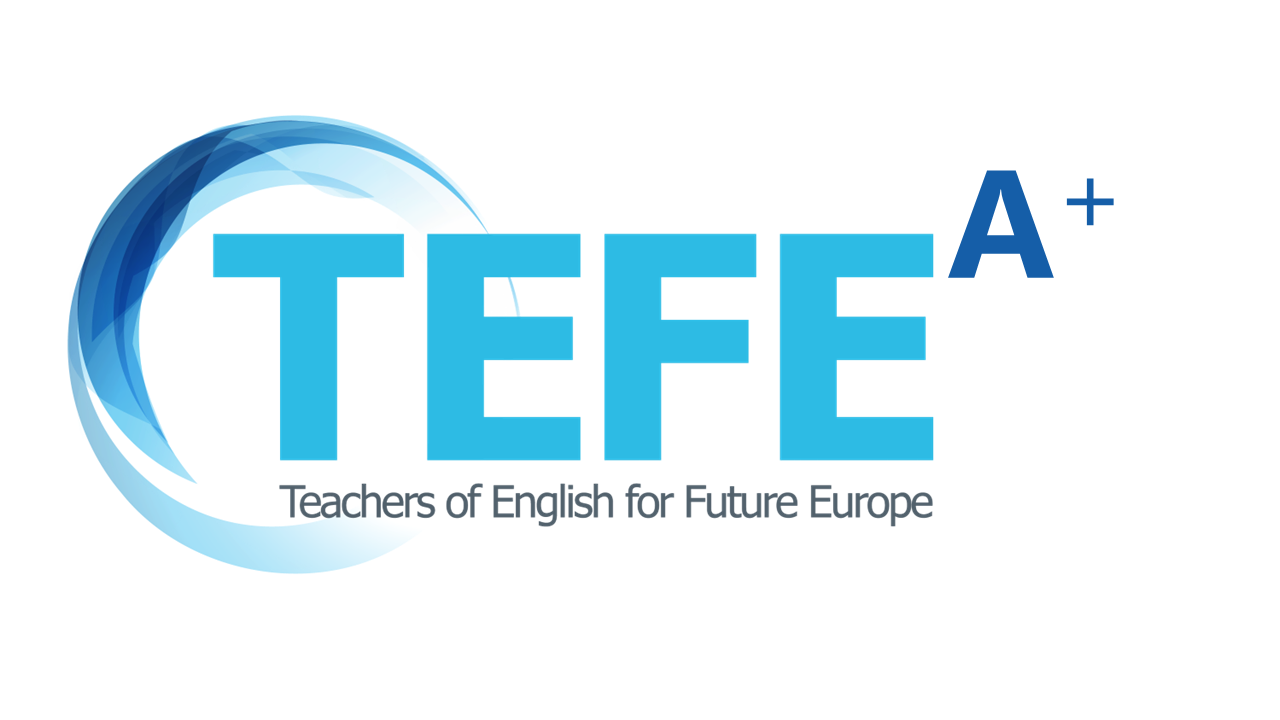University of South Bohemia in České Budějovice, Czech Republic

The University of South Bohemia (USB) was founded in 1991, following a long tradition of educating teachers and university experts in various fields of agricultural production, theological studies and the tradition of fish farming and fisheries. The USB, as one of the first 15 institutions in the Czech Republic and one of the first 400 international, holds a prestigious HR Excellence in Research Award.
USB is a modern public university located in the town of České Budějovice. It educates more than 10,500 students at 8 different faculties and in more than 200 programmes including bachelor’s & master’s degrees as well as doctoral programmes. The faculties include: Faculty of Economics, Faculty of Fisheries and Protection of Waters, Faculty of Arts, Faculty of Education, Faculty of Science, Faculty of Theology, Faculty of Health and Social Sciences, Faculty of Agriculture. USB is proud to be a top-quality science & research centre specialising in education and research in natural, humanist and social sciences.
The Institute of English Studies was founded on 1st September 2010. As the most recently established department at the School of Arts, it is dynamic in both its research orientations and teaching. It has 9 full-time members of staff all of whom are both research active as well as being involved in teaching. Students can choose from a range of study programmes. These include: a Bachelor’s degree programme in English Language and Literature (combined with Czech Studies, History, Biology, Chemistry and Romance Studies), consecutive Master’s degree programme in English and American Literature, consecutive Master’s programme in Teacher Training for Upper Secondary Schools in English Language and Literature and a follow-up Master’s degree in translation in combination with French and Spanish. Provision of practical training is valued highly. The Institute is increasingly investing effort to develop links that will create professional development opportunities for its students. Our graduates find employment in all industries and careers where creative thinking and an excellent knowledge of English are required.

Helena Lohrová, PhD
Helena Lohrová is an Assistant Professor at the University of South Bohemia (USB) in Ceske Budejovice, Czech Republic. She earned her PhD at the University of Birmingham, UK. She teaches courses in linguistics and discourse both on the programme of general linguistics and on the teacher training programme. Her overall role is to lead the TEFE project and specifically together with her colleagues at USB and Comenius University in Slovakia to develop Output 2 work package – TEFE Employability Skills Framework.

Ivo Petrů, PhD
Ivo Petrů is a lawyer-linguist specialized in Legal language and its translation in the European context, especially from French to Czech. In his work at the University of South Bohemia, in addition to teaching and research, he also deals with project management. He also develops his abilities in the last-mentionned area in his volunteering activities as chairman of the Alliance française de Bohême de Sud association. In particular, he has experience and know-how in managing of a Strategic Partnership project Erasmus+, since he was in 2015-2021 the Chief project manager of the project. Legal systems and Business law in the EU: Translating and Interpreting in diversity”(project of 7 European partners from CZ, FR, SP, PT, RO, LV, SK subsidized by 214 763 EUR). His role within TEFE project is leading of project management activities.
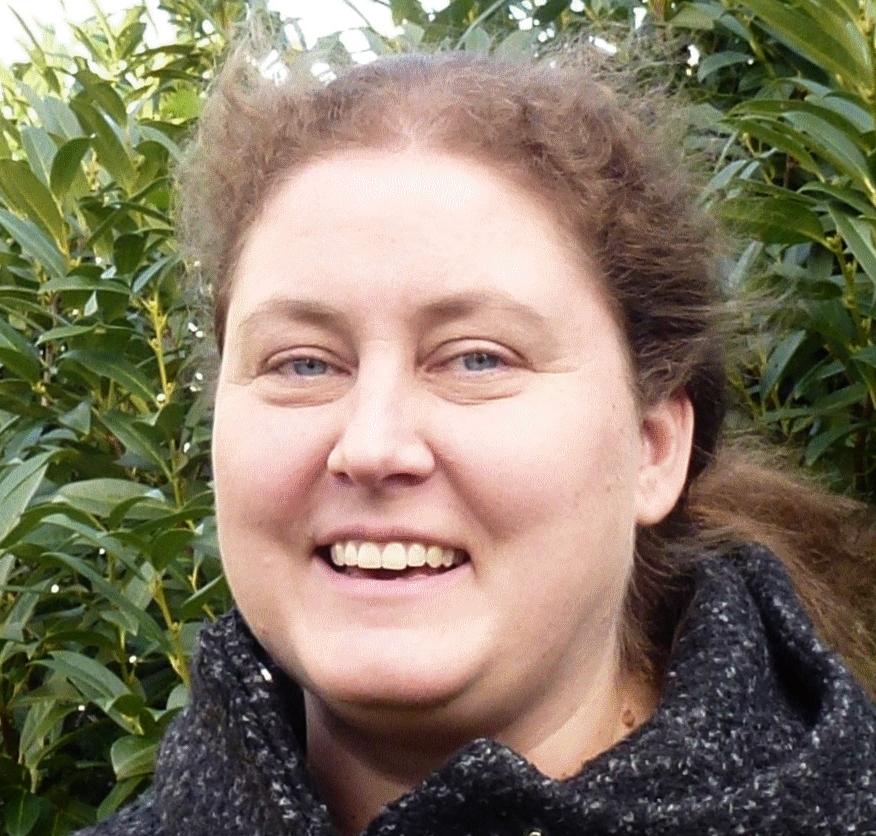
Alena Prošková, PhD
Alena Prošková is an Assistant Professor at the University of South Bohemia (USB) in České Budějovice, Czech Republic. She is an experienced teacher trainer and teaching practice coordinator. She specializes in EFL teaching methodology, with a particular focus on competence-based education, CLIL and diachronic research of teaching materials. In the TEFE project, she is actively involved in coordinating the content and delivery of project learning activities and intellectual outputs.
Comenius University in Bratislava, Slovakia

Lyn Steyne
Hello, my name is Linda (Lyn) Steyne and I’m a lecturer and teacher trainer at the Faculty of Arts, Comenius University in Bratislava, where I’m responsible for the Teaching English as a Foreign Language program at the Department of British and American Studies. I’ve taught English to learners aged nine and up in public primary and secondary schools, as well as at several universities. My interests lie in teacher education and teaching writing. I am passionate about teachers learning and working together to improve the lives of all our students, both now and in the future.
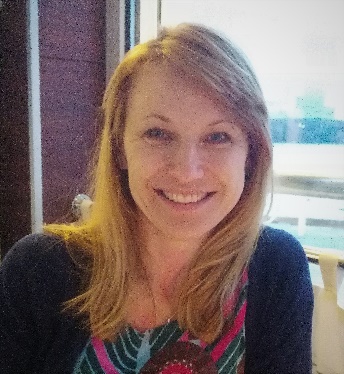
Eva Reid
My name is Eva Reid and I am an associate professor at the Comenius University in Bratislava, Slovakia. My pedagogical and research interests are methodology of teaching English as a foreign language, specifically development of intercultural communicative competences in English language education, teaching English to gifted pupils and teaching English pronunciation. I have published numerous monographs, journal articles and course-books all reflecting my research and my research is reflected in my pedagogical practice.
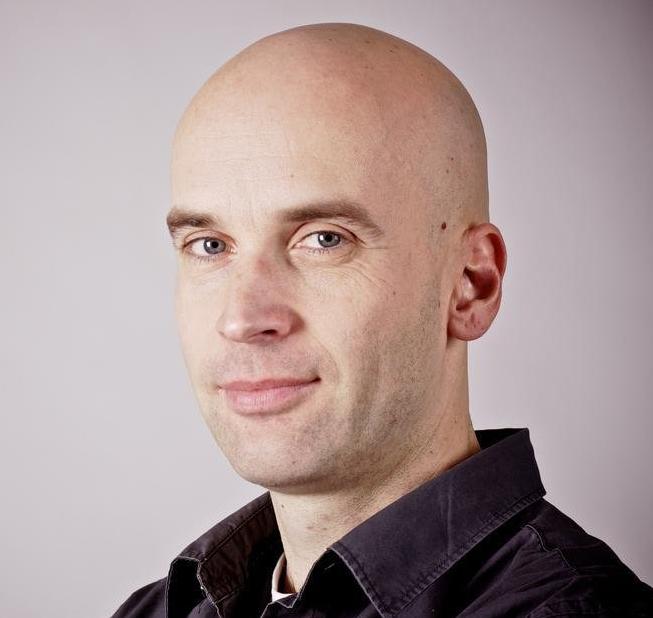
Ivan Lacko
Ivan Lacko is an assistant professor at the Department of British and American Studies, Faculty of Arts, Comenius University in Bratislava, Slovakia. He teaches courses in American literature, theatre, performance, and popular culture, as well as courses in creative writing and dramatic/performative creation. He has published a number of articles on political aspects of contemporary theatre, the use of theatre in pedagogy, the role of the arts in higher education, and on classical American literature.

Currently, the department is experiencing a revival of sorts in regard to ELT training with more students interested in the profession entering both the bachelors and masters programmes with the clear intent of becoming English teachers, both at state and language schools. Students in both the BA and MA programs are involved with colleagues at local secondary, primary, and language schools, both observing and teaching, as well as being mentored.
The department was foundational to the founding of the Slovak Chamber of English Language Teachers (SCELT), with two faculty members on the Executive Committee and one on the Advisory Board. Working with SCELT, the department has hosted conferences, put on local workshops, and engaged current students in those professional development training activities in order to initiate them into the community of ELT professionals. In 2013 and 2014, we organised our students to both volunteer and be actively involved in Slovakia’s largest international ELT conference, ELT Forum. In September 2015, March 2019, and September 2019, our students were instrumental to the organisation and running SCELT’s international conferences. In March of 2020, several current MA students will be involved as volunteers and participants at IATEFL Slovenia’s international conference in Slovenia. A current instructor and a few graduates will also be doing workshops at the conference.
The Faculty of Arts of Comenius University in Bratislava also strongly believes in active civic duty. With the state of public affairs being what it is in Slovakia at this time, the Department of British and American Studies holds high the value of truth in this regard. One project built on this is our U.S. Embassy small grant project English for Journalists run by one of our instructors, Linda M. Steyne, PhD, at our department and which has been running for since 2016. The students are journalists who rank among the best in their profession in Slovakia.
The department employs between 15-18 full-time assistant and associate professors and lecturers who teach in two study programs (teacher training and translation/interpreting) at both bachelor’s and master’s levels. Approximately 60 students graduate in the BA programs each year, and about 50 in the master’s programmes.
Aston University, United Kingdom
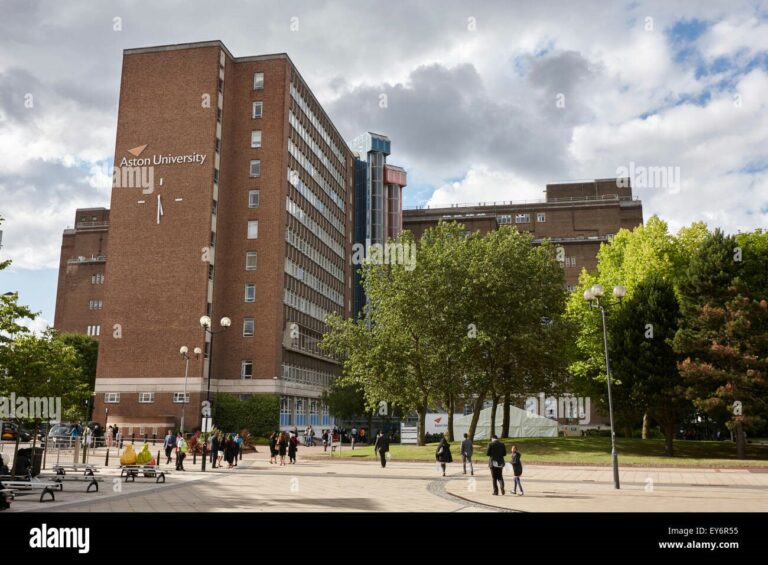
Aston University has an excellent track record with EU funded research and training programmes.
The project team is positioned in the English Department, the Centre for Language Research at Aston (CLaRA) and the Centre for Critical Approaches into Society and Culture (CCISC). The English department has an articulately applied focus, and the various sub-disciplinary areas are engaged in research with social, organisational and educational focus. The English department currently comprises a total of 14 members of staff who teach on a range of programmes at undergraduate and postgraduate level and who are all research active. 8 members specialise in Applied Linguistics, 3 in English Literature and 3 members specialise in TESOL. Department members are full-time employees, all have relevant PhD qualifications. Staff members are on research (30%) and teaching (70%) contract. Each member of the department is an active researcher and contribute to the undergraduate English single honours, English joint honours and TESOL programmes. Aston’s on-campus and distance TESOL programmes have attracted a steady number of students, the average yearly intake has been 15.
CLaRA is a research centre dedicated to language and language education. The Language Education special interest group has 14 members, from across modern foreign languages, English, and the Centre for English Language and Communication at Aston (CELCA). CCISC research centre brings together colleagues from Translation Studies, Sociology, Social and Public Policy, Politics, Psychology and Organization studies. It’s membership is over 40.
Both centres and the department have a multidisciplinary composition, have a strong research profile and wide experience in facilitating interdisciplinary events. They regularly organise research events delivered to interdisciplinary audiences and regularly hosts distinguished academic visitors. Two recent noteworthy events that have been co-hosted by the English department and the two research centres were the Annual Conventions of the British Association of Applied Linguistics (in 2015) and Discourse, Communication and the Enterprise (in 2017). Other relevant events the collaboration with the national centre for Content and Language Integrated Learning, including the hosting of workshops and presentations. CLaRA is also heavily involved in the work of the British Association for Applied Linguistics special interest group: Linguistics and Knowledge about Language in Education.
The TESOL team has previously led various teacher education projects relevant to this bid. These have included a 3-year TEMPUS project led by Dr Sue Garton in collaboration with Pedagogische Hochschule Freiburg Institut für Anglistik. The project involved the design and evaluation of modules for a blended learning MA level programme intended for secondary school teachers in Russia, Ukraine and Uzbekistan. After the successful completion of this project further successful Erasmus and Erasmus+ projects have enabled the TESOL staff to visit the project members in their institutions and take part in the co-teaching of the Master’s level materials. This process has benefited all parties concerned encouraging the TESOL team to get insight into the local practices of teachers in the respective countries. The project members have visited Aston University on many occasions to take part in various professional development activities organised by the TESOL team.

dr Nur Kurtoglu-Hooton
Dr Nur Kurtoglu-Hooton is one of the members of the team at Aston University. Her role involves contributing to the design of research-informed, practice-based portfolio of teaching and training as well as reflective and evaluative tools to be employed in the project by all partner institutions and disseminated more widely after the project has been completed.

dr Muna Morris-Adams
I’m Dr Muna Morris-Adams, lecturer at Aston University. My role in the project is to contribute to the design of research-informed and practice-based tools for use in teacher training, with the aim of promoting internationalisation and employability.

Joyce Lim
Dr Joyce Lim is a Lecturer in TESOL and Applied Linguistics at Aston University. Her research interests lie in corpus linguistics and language education, particularly in second language writing development. Her role in the project involves evaluating the effectiveness of the toolkit, which was developed from the previous project, and contributing to publishing the final evaluation project.
Eötvös Loránd University (ELTE) in Budapest, Hungary
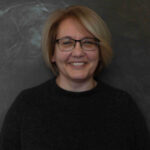
Nóra Tartsay Németh
Nora Tartsay Nemeth is a teacher and teacher trainer at the School of English and American Studies, Eötvös Lorand University, Budapest. She specializes in learning technologies and digital literacies, with a special interest in e-learning. She is the e-learning consultant of the Faculty of Humanities at ELTE, offering training in online course design in Moodle and Canvas. She is the international coordinator at the School of English and American Studies.

Ildikó Lázár
Ildikó Lázár currently works at the Department of English Language Pedagogy, Eötvös Loránd University, Budapest. Ildikó does research in intercultural communication, English language teaching methodology and changes in teachers’ beliefs in professional development. Her most recent publications are ‘EFL learners’ intercultural competence development in an international web collaboration project’, ‘Developing activities that make blended learning effective’ in the Cambridge Guide to Blended Learning and ‘TASKs for Democracy: 60 activities to learn and assess transversal attitudes, skills and knowledge’ (Council of Europe).
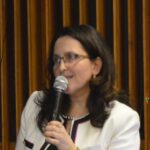
dr Tímea Tiboldi
My name is Tímea Tiboldi, I graduated from ELTE University Budapest in English, Media and Communication and Portuguese. My PhD is on effective English teaching. I have been teaching at the English Applied Linguistics Department at ELTE for more than 20 years. I worked as a coordinator of the media specialization (English in the Media) at the department 10 years. Currently, I work as Director of Studies at the School of English and American Studies at ELTE University.
I also hold a degree in business studies and a post-graduate degree in HR. My main scope of interest is intercultural communication, effective teacher training, the media and teaching ESP. I have written two handbooks for diplomats and have been teaching diplomats in the Ministry of Foreign Affairs and Trade Hungary for mor than 20 years.

Building on the success of the TEFE project (2020-2023), which united six European universities, TEFE A+ aims to integrate international teaching practice into teacher education. We develop strategies, provide placements and supervision, and promote the TEFE Framework. Over the project’s three years (2023-2026), we aim to engage institutions, educators, mentors, and students across the TEFE consortium and the wider EU.
Our activities include the annual TEFE BIP International Teaching Practice (ITP) Induction Programme, the creation and facilitation of ITP placements and internships, intensive staff training events, and teacher mentor support. We also provide training for educational stakeholders and will host a Dissemination Conference in 2026 to share our findings and deepen the understanding of the role of ITP in training future English teachers. At the end of the TEFE A+ project, we will produce an evaluation report on its implementation.
Participants in our project have access to resources including the TEFE Framework, the TEFE Charter, and the COIL (Collaborative Online International Learning) platform. The TEFE COIL platform serves as the project’s digital interface promoting collaborative international learning and interactive engagement. It hosts project resources alongside forums for the participant community as well as a Partner Zone.
Explore the possibilities TEFE A+ offers and join our TEFE community in advancing the internationalisation of teaching practice. Click here/on the link below to share your interests, and we will be in touch to discuss involvement.
Public University of Navarra, Spain

Created in 1987 by the Parliament of Navarre, the Public University of Navarre (UPNA) is a relatively small public university in the north of Spain, with campuses in Pamplona and Tudela. Academically, it focuses on Humanities, Social Sciences, Law, Engineering, Natural Sciences, and Health Sciences. Its degrees in Education comprise one of the largest bodies of students. It is one of Spain’s leading universities in terms of teaching, research and transfer, occupying, along with 16 other Spanish public universities, the upper quartile when it comes to overall productivity (2017 ISSUE ranking, BBVA-IVIE). UPNA offers 25 bachelor degrees and 26 master programmes, with 6961 and 766 students respectively.
The teaching and research staff is organised around 6 research institutes with more than 270 researchers: the Institute for Advanced Social Research (ICommunitas), the Institute of Smart Cities (ISC), the Institute for Advanced Materials (InaMat), the Institute for Advanced Research in Business and Economics (Inarbe), the Institute for Innovation and Sustainable Development in Food Chain (IS-Food), and the Institute for Multidisciplinary Applied Biology Research (IMAB). The university is also part of Navarrabiomed (joint centre with the Government of Navarre’s Department of Health).
Regarding internationalisation, UPNA has signed agreements with over 300 universities in 50 countries. In the course 2018/19, UPNA managed 750 student mobility exchanges: 430 out-coming and 320 incoming students. With these figures, UPNA meets the strategic objective of sending abroad more than 25% of its graduates. As for Erasmus+ projects, UPNA has been a member or coordinator of 7 KA2 strategic partnerships, 3 KA2 capacity building projects, 1 KA1 Jean Monnet, 1 Sport Action and 1 KA2 Knowledge Alliance. And UPNA is one of the most successful applicants to the KA107 program in Spain with 367.556€ assigned in the last call.
The Doctoral School of the UPNA offers 15 Doctoral Programmes and 65 Ph.D students have been awarded a doctoral degree on average since 2013. In the academic year 2018/19, 395 students, 20.4% international, were enrolled in the Doctoral School. In 5 years, since its creation, the school has increased the number of international students from 9% to 20%.

Monica Aznárez, PhD
I am a lecturer at the Public University of Navarre (Spain). I teach different courses on Language Teaching Methodology in the Primary Education Bachelor’s Degree and in the Secondary Education Master’s Degree. I hold a PhD in Spanish Linguistics and I have always been interested in language teaching methods. I have worked as a lecturer at different universities in the US, Peru and Australia. These international experiences have greatly helped me become a better teacher and grow as a professional. My research interests include language teaching at the Primary and Secondary levels, particularly the teaching and learning of writing skills in L1 and L2.

M. Camino Bueno Alastuey, PhD
M. Camino Bueno Alastuey PhD is an Associate Professor of Applied Linguistics at the Public University of Navarra, where she has been teaching English for Primary Teachers and Using ICT to Teach Foreign Languages in the Primary and Early Childhood Education Bachelor Degree and the Master for Secondary Education for the past 20 years. Her research interests include telecollaboration, collaborative L2 writing and computer assisted language learning, especially effective course design with new technological tools and the effect of technology on oral and written skills development. She is also interested in teacher training and in how to develop foreign language teachers´ digital teaching skills. She has published nationally and internationally on those topics.

Jesús Lasheras
Jesús Lasheras Balduz is an assistant teacher in the Dept. of Human Sciences and Education and an assistant researcher in I-Communitas, Institute for Advanced Social Research, at the Public University of Navarre. His current professional teaching career focuses on Teaching English as a Foreign Language (TEFL) and Information and Communication Technologies (ICT) applied to TEFL in the BA programmes in Early Childhood and Primary Education. He has also worked as an international academic coordinator aiming at promoting Education students and teachers’ international mobility and searching for new partner universities. His primary research interests include the field of Second Language Acquisition (SLA) and TEFL, with an emphasis on Content and Language Integrated Learning (CLIL), motivation towards the learning of English in bilingual programmes and the effect of ICT tools on TEFL.
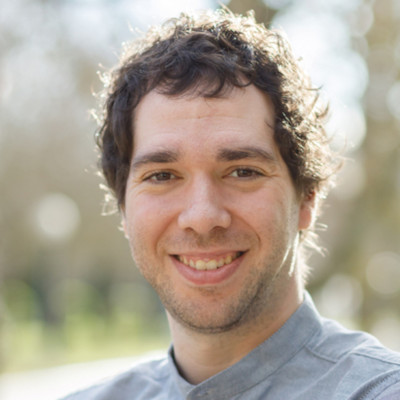
Unai Pérez-Goya, PhD
Unai Pérez-Goya is an Assistant Professor in the Department of Statistics, Informatics, and Mathematics at the Public University of Navarre, where he has been teaching since 2020. He holds a PhD in Industrial Sciences and Technologies from the Public University of Navarre (2019), a Master’s degree in Innovation and Research in Informatics with a specialization in Distributed Systems from the Polytechnic University of Catalonia (2015), and a Bachelor degree in Computer Engineering from Mondragon University (2012).
He is part of the Spatial Statistics research group and is a research trainee at the Institute for Advanced Materials (INAMAT). Since 2015, he has worked on various research projects as a project assistant and served as an associate professor from 2016 to 2025.
University of Passau, Germany
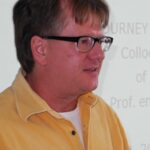
prof. Karsten Fitz
Karsten Fitz is a Professor of American Studies / Culture and Media Studies at the University of Passau. His expertise lies in the fields of Native American Studies, American popular visual culture, cultural memory, American political culture, and German-American cultural relations. What brings him to the TEFE-project is his interest in teaching American Studies in the EFL-classroom, on which he has also published, and his passion for intercultural academic exchanges.

dr. Hans-Stefan Fuchs
Hi, I am Hans from Passau University. Together with my colleagues I’m part of Passau’s TEFE-Group. I’m looking forward to working with you together.
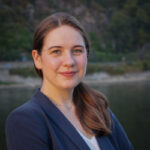
Teresa Fischler
Teresa Fischler is a research assistant at the University of Passau. She joined the TEFE-Team while studying International Cultural and Business Studies in the master’s programme at the University of Passau.
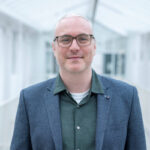
Matthias Fuchs
Matthias Fuchs is the Managing Director at the Centre for Teacher Education at the University of Passau, where all processes concerning teacher training are coordinated. One of his main areas of responsibility is the project management of national and international third-party funded projects. Alongside digitalisation, education for sustainable development and heterogeneity and diversity, there is a particular focus on the internationalisation of teacher training courses and enabling students to gain international experience.

Dr. Jonas Scharfenberg
Jonas Scharfenberg is a tenured researcher at the University of Passau in the field of educational science. His research interests are teacher professionalization and professionalism, career choice, diversity and interculturality, assessment in the context of diversity and inclusion as well as methodological issues, particularly in the context of transnational research. His research has an international focus; next to TEFE, he works together with partners in the US, South Africa, Sweden and Romania in both research and teaching practice.

Prof. Dr. Ricardo Römhild
Ricardo Römhild is a researcher and lecturer in the field of language (teacher) education. He currently serves as acting professor for English language education at the University of Passau. He focuses on education for global citizenship and sustainability in the context of language education – particularly socio-environmental justice, decoloniality, cosmopolitanism, and pedagogies of (critical) hope. With a background as a teacher at secondary and tertiary levels in Germany and the USA, these perspectives and questions inform his work both in research and in teaching at university and in teacher workshops.
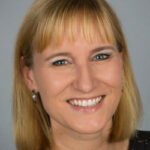
Eva-Maria Felscher
Eva-Maria Felscher is a teacher for upper secondary schools (Gymnasium). Currently, she is seconded to the University of Passau as a lecturer at the Professorship for Didactics of English Language, Literature and Culture, incorprating her practical experiences by supervising students on school internships and offering seminars interlinking the scientific theories with pedagogical and didactic practice in the first phase of teacher training.
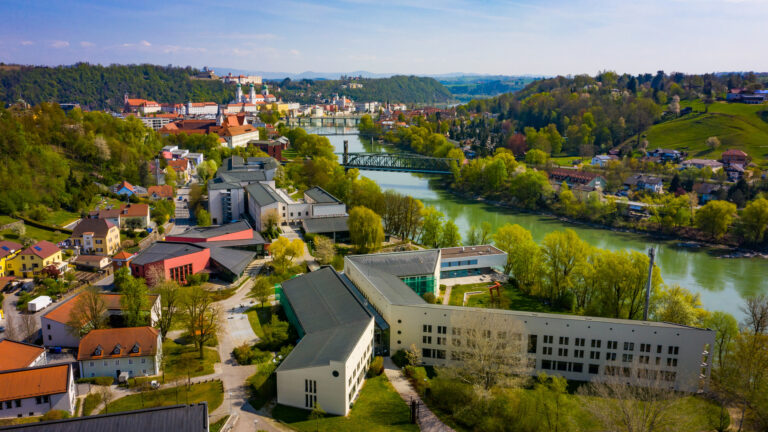
• The Faculty of Law
• The Faculty of Business, Economics and Information Systems
• The Faculty of Arts and Humanities with the Department of Catholic Theology
• The Faculty of Computer Science and Mathematics
In December 2019 a number of 12,323 students and doctoral students were enrolled, including 1,742 international students (14.14%) from e.g. India (186), Austria (153), China PRC (111), Czech Republic (26), Spain (24), Poland (16), Slovakia (14), UK (≤ 4).As of winter semester 2019/2020, the figures show a total of 1,159 primary occupation. We count 472 academic support staff and 687 academics across the University, including 122 professors (chaired professors: 91, non-chaired professors: 29, assistant professors: 2), who teach and conduct research on a wide range of subjects (1 July 2019). The UP stands for excellent research, innovative teaching and intensive knowledge transfer activities as well as diversity and openness to the world. At the border to two countries, but right in the heart of Europe, science, teaching and culture find their unique combination in Passau. For us, internationalisation is an identity-shaping characteristic and an important strategic goal. Our international connections are underpinned by the vibrant partnerships we maintain on a global scale.
A total of 244 partnerships were concluded with universities across the globe (March 2019). We carry out student exchange with partner universities in e.g. Czech Republic (7), Spain (22), Poland (9), Slovakia (2), UK (8); the UP also has double degree programmes with EU Partner universities.
The Faculty of Arts and Humanities is the largest of the University’s four faculties and comprises the departments Education, Catholic Theology, Regional Cultural Studies/Area Studies, Governance and Historical Studies, and Language, Texts and Media, which together represent a total of 56 chairs and professorships. 6,775 students are currently enrolled in the 25 degree programmes – undergraduate (9), including Bachelor of Education, and Master’s programmes (12), including Master of Education – administered by the faculty. 2,439 of these students are enrolled in teacher education programmes: primary education, and three types of secondary education (Mittelschule, Realschule, and Gymnasium).
The certified Language Centre offers language courses for students of all faculties in Chinese, Czech, English, French, German as a Foreign Language, Indonesian, Italian, Polish, Portuguese, Russian, Spanish, Thai, Turkish and Vietnamese. These language courses offer subject-specific language programmes for students of cultural studies & international relations (including teaching degree students); business & economics; law; and computer science & mathematics. As a pilot scheme, we have implemented an English course specially designed for teaching degree students focusing on educational sciences and ‘teaching in English’.

e-mail: tefe.project@gmail.com
